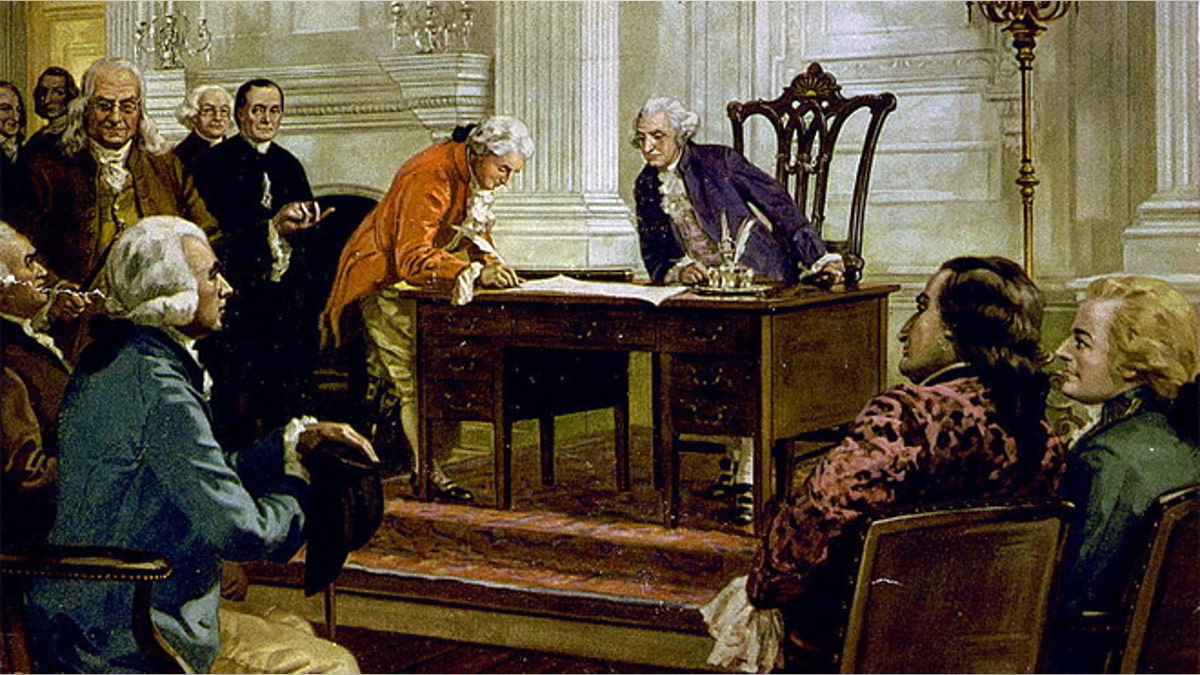
A reproduction of a painting of George Washington, Benjamin Franklin and others signing the U.S. Constitution in Philadelphia, Pennsylvania. (Library of Congress)
The Constitution is clear: it is the role of Congress to make all laws, the Judiciary to interpret the laws, and the President to “take care that the laws be faithfully executed.”
This system was wisely set into place by our country’s framers because they saw the effects of executive overreach by the crown in England and designed the Constitution to avoid concentrating power in one leader or one branch of government.
The Constitution grants Congress, not the president, the power to make legislative decisions.
The framers knew first hand that the concentration of power in the same hands was a threat to individual liberty and the rule of law.
The Constitution grants Congress, not the president, the power to make legislative decisions.
Unfortunately, as prominent law professor Jonathan Turley – who stated in his testimony that he voted for President Obama – observed at a recent House Judiciary Committee hearing, there has been “a massive gravitational shift of authority to the Executive Branch that threatens the stability and functionality of our tripartite system.”
Although this trend has occurred over the past several decades under both Republican and Democratic administrations, some constitutional scholars note that executive overreach has accelerated at an alarming rate under President Obama.
In President Obama’s State of the Union address in front of Congress and the American people, the president vowed to act alone and that “where [Congress] won’t act, I will.”
He also boldly asserts that he has a “pen and a phone” to change our laws through executive decrees. These have not been empty proclamations and should be troubling to every American, regardless of political party.
Throughout the past five years, President Obama has routinely failed to enforce laws that he disagrees with for policy reasons and has stretched his authority to put policies in place that the American people, through their elected representatives, have rejected.
For example, President Obama has refused to enforce those parts of our nation’s immigration laws that are not to his political liking, has waived portions of our welfare laws, has stretched our environmental laws to accommodate his policy objectives, and has waived testing accountability provisions required under the “No Child Left Behind” education law.
Political appointees at the Justice Department have announced that rather than work with Congress to amend the federal criminal code, they will simply stop prosecuting low-level drug offenders under mandatory minimum sentencing laws.
And now that his signature health care law has not been working and revealed his empty promises, President Obama has changed that law unilaterally over 20 times.
While there are varying opinions on these important issues within Congress, the Constitution grants Congress, not the president, the power to make legislative decisions. The Constitution does not confer upon the president the executive power to circumvent Congress and write, or rewrite, laws through executive fiat.
We cannot allow President Obama, or any president, to ignore the constitutional limits on executive power. The framers did not expect America’s elected representatives in Congress and the federal judiciary to sit on the sidelines and watch as one branch aggrandized its own powers and exceeded the authority granted it by the Constitution.
Without Congress and the courts stepping in, the constitutional requirement that the President “take care that the laws be faithfully executed” will become an unenforceable and meaningless check on presidential ambition.
The House Judiciary Committee has studied this growing problem, received input from constitutional scholars, and approved carefully-crafted legislation that reins in executive overreach. The House will vote on this legislation this week, taking us one step closer to restoring balance to the separation of powers.
These bills—the ENFORCE the Law Act and the Faithful Execution of the Law Act—allow Congress to challenge executive overreach in the courts, expedite judicial review of those challenges, and increase accountability and transparency when the Executive Branch decides not to enforce our nation’s laws.
With an unrestrained Executive Branch that knows no limits, it is ultimately up to the Congress and the courts to check the President’s overreach and restore balance to our system of government.
Preventing the president from overstepping the boundaries of his constitutional authority is not about partisan politics. It is about preserving the fundamental premise of our constitutional design: That a limited government, divided into three separate branches exercising enumerated powers, is necessary to protect individual liberty and the rule of law.








































